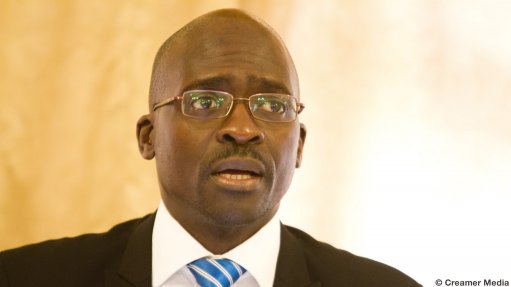
Minister Malusi Gigaba
Photo by: Duane Daws
January 24, 2014
From Creamer Media in Johannesburg, I’m Schalk Burger.
Making headlines:
The South Sudan government and rebels sign a ceasefire deal.
Eskom reiterates its warning of a‘tight’ electricity system.
And, Minister Malusi Gigaba calls for a review of the Preferential Procurement Act to hasten ‘radical’ empowerment.
South Sudan's government and rebels signed a ceasefire on Thursday to end more than five weeks of fighting that divided Africa's newest nation and brought it to the brink of civil war.
US President Barack Obama, UN Secretary-General Ban Ki-moon and the UN Security Council welcomed the news, but several diplomatic sources in New York said they were worried the killing could continue. Fighting between troops loyal to President Salva Kiir and those backing the vice president he sacked in July, Riek Machar, erupted in mid-December.
Thousands of people have been killed and more than half a million people have fled their homes, prompting the regional grouping of nations, IGAD, to initiate peace talks. More than 70 000 people have sought refuge at UN bases around the country.
Parastatal Eskom has reiterated its caution that the national electricity system will remain tight until new generating capacity comes on stream and essential generation maintenance is completed.
In its biweekly system status bulletin on Thursday, the utility appealed to electricity consumers to reduce their electricity use as the country moved further into summer and Eskom continued with its planned maintenance on the generating units.
Public Enterprises Minister Malusi Gigaba on Thursday told a meeting of the Black Management Forum that he would continue to pursue a review of the Preferential Procurement Policy Framework Act in a bid to hasten empowerment.
Gigaba said that the “many” financial institutions under the control of government must “shift in how they finance black business” and encourage people to take risks to industrialise.
To support infrastructure roll-out, government would put in place financing levers intended to support black industrialists and the transfer of wealth into black hands.
He cautioned, however, that black business wouldn’t be rewarded without hard work and “hands-on application”, which would enable these companies to become true entrepreneurs rather than “middle men”.
Also making headlines:
At least 16 people died in clashes in Central African Republic on Thursday as new interim president Catherine Samba-Panza took office.
The international financial crisis has scarcely affected sub-Saharan Africa, with the region still having a 6% growth forecast for 2014.
And, US President Barack Obama says a ceasefire is the 'critical first step' to peace in South Sudan.
That's a roundup of news making headlines today.